
Critical Education
Scope & Guideline
Bridging Theory and Practice for Social Justice in Education
Introduction
Aims and Scopes
- Social Justice and Equity in Education:
The journal emphasizes the importance of social justice and equity in education, advocating for practices that address systemic inequalities and promote inclusivity. - Critical Pedagogy:
It explores critical pedagogy as a means to empower educators and students, encouraging transformative practices that challenge oppressive structures within educational systems. - Neoliberal Critique:
A consistent focus on critiquing neoliberal influences in education is evident, examining how market-driven ideologies impact educational policies and practices. - Intersectionality and Diversity:
The journal addresses issues of intersectionality and diversity, highlighting the experiences and voices of marginalized groups within educational contexts. - Activism and Advocacy:
It promotes activist approaches to education, encouraging educators to engage in advocacy and social movements that seek to reform and improve educational systems. - Research Methodologies:
The journal employs a variety of research methodologies, including qualitative, critical, and autoethnographic approaches, to provide nuanced insights into educational issues.
Trending and Emerging
- Impact of Neoliberal Policies:
There is a significant increase in research addressing the impact of neoliberal policies on education, particularly regarding privatization and market-driven approaches that challenge public education. - Indigenous Education and Perspectives:
Emerging themes include a focus on Indigenous education, emphasizing the importance of Indigenous voices and literature in shaping educational practices and teacher perceptions. - Critical Technology and Ed-Tech:
Recent publications are increasingly exploring the intersection of technology and education, critically analyzing the implications of ed-tech in the context of neoliberalism and social justice. - Activism in Education:
A growing trend in the journal is the exploration of activism within educational settings, highlighting the role of educators and students in social movements and their impact on educational reform. - Queer and Gender Studies in Education:
There is an emerging focus on queer and gender studies within educational research, addressing the unique experiences of LGBTQ+ students and advocating for inclusive educational practices.
Declining or Waning
- Traditional Educational Reform Models:
There appears to be a waning interest in traditional educational reform models that do not align with critical and transformative pedagogies, as the journal increasingly emphasizes more radical critiques. - Standardized Testing and Accountability:
Research focused on standardized testing and accountability measures is less prevalent, reflecting a broader move towards critiques of neoliberalism that question the validity and impact of such assessments. - Conventional Teacher Training Practices:
There is a noticeable decline in discussions surrounding conventional teacher training practices, as the journal shifts towards more progressive and critical approaches to teacher education. - Global Educational Comparisons:
While previously a theme of interest, comparative studies between different educational systems globally are less frequently featured, indicating a potential narrowing of focus towards local contexts and issues.
Similar Journals
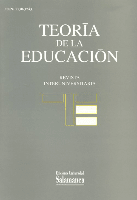
Teoria de la Educacion
Unlocking the Potential of Educational TheoriesTeoria de la Educacion is a leading academic journal published by EDICIONES UNIV SALAMANCA, specializing in the fields of Education and Philosophy. With an impactful history since its inception in 1986, the journal operates under an open-access model, ensuring that vital research reaches a broad audience without financial barriers. Based in Spain, this journal not only boasts high visibility with its Q1 rankings in both Education and Philosophy but also achieves notable standings in Scopus rankings, placing in the 96th percentile in Philosophy and the 80th in Education. The scope of the journal encompasses various educational theories, methodologies, and philosophical underpinnings that shape contemporary discourse, making it an invaluable resource for researchers, professionals, and students alike who seek to understand and innovate within these crucial disciplines. By bridging theory and practice, Teoria de la Educacion fosters critical dialogue and advances scholarly insights, solidifying its role as a keystone publication within the academic landscape.
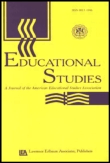
Educational Studies-AESA
Connecting research to practice in education and social sciences.Educational Studies-AESA, published by Routledge Journals, Taylor & Francis Ltd, is a prestigious peer-reviewed journal that serves as a vital platform for sharing cutting-edge research in the fields of education, sociology, and political science. With an ISSN of 0013-1946 and an E-ISSN of 1532-6993, this journal holds a commendable status, reflected in its strong rankings: it is positioned in the Q2 category in both Education and Sociology/Political Science, emphasizing its significant impact in these disciplines. Moreover, with Scopus rankings that place it in the 62nd and 48th percentiles within its categories, Educational Studies-AESA is recognized for its contributions to scholarly discourse and is an essential resource for researchers, professionals, and students alike seeking to deepen their understanding of educational dynamics and their societal implications. While this journal is not currently open access, it remains a vital scholarly source, enriching the academic community from its base in the United Kingdom, addressing vital educational issues from 2018 to 2024 and beyond.

EARI-Educacion Artistica-Revista de Investigacion
Pioneering New Frontiers in Arts Education ResearchEARI-Educacion Artistica-Revista de Investigacion is a distinguished peer-reviewed journal that explores the intersection of art and education, published by the University of Valencia's Department of Prehistory and Archaeology. With its commitment to advancing knowledge in artistic education, the journal serves as a pivotal platform for scholars, educators, and practitioners to share innovative research and transformative practices in the field. Since embracing an Open Access model in 2011, EARI has facilitated broader dissemination of research findings, ensuring that the insights and contributions of its authors reach a global audience. While specific ranking metrics such as HIndex and Scopus ranks are not provided, the journal remains recognized for its scholarly rigor and relevance within the arts education community. Researchers, professionals, and students looking to stay at the forefront of artistic education will find EARI an invaluable resource for contemporary discussions, methodologies, and pedagogical approaches in the discipline.
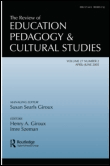
Review of Education Pedagogy and Cultural Studies
Bridging Theory and Practice in Education and Cultural StudiesReview of Education Pedagogy and Cultural Studies, published by ROUTLEDGE JOURNALS, TAYLOR & FRANCIS LTD, is a leading academic journal that spans critical themes in the fields of education and cultural studies. With an ISSN of 1071-4413 and an E-ISSN of 1556-3022, this quarterly publication showcases groundbreaking research, theoretical frameworks, and innovative pedagogical practices, making it an invaluable resource for scholars, educators, and policymakers alike. Hailing from the United Kingdom and set to converge from 1994 to 2024, the journal has gained recognition with impressive rankings—occupying Q1 in Cultural Studies and Q2 in Education as of 2023. Notably, it ranks #196 in Cultural Studies and #847 in Education according to Scopus, highlighting its significant influence in shaping contemporary discourse and research. Engaging with contemporary challenges, the journal aims to bridge theoretical insights and practical implementation, thereby contributing to the advancement of educational practices informed by cultural contexts. As an essential platform for debate and dissemination of knowledge, Review of Education Pedagogy and Cultural Studies welcomes contributions that explore the intersections of education and culture, fostering a deeper understanding of their impact on society.
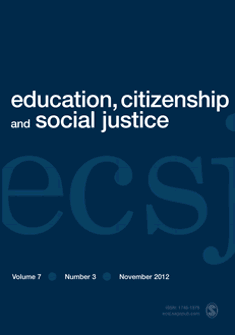
Education Citizenship and Social Justice
Illuminating pathways to educational justice.Education Citizenship and Social Justice is a prominent academic journal published by SAGE Publications Inc, dedicated to advancing the discourse around education's role in citizenship and social justice issues. Since its inception in 2006, the journal has provided a critical platform for researchers, educators, and policymakers to explore the intersections of education, citizenship, and equity within diverse societal contexts. With an impressive ranking of #685 out of 1543 in the Social Sciences - Education category and a 2023 Quartile 2 status, it is firmly established as a significant resource in its field. Although the journal does not currently operate with an open access model, its impact on the education sector remains profound, offering valuable insights that contribute to the development of inclusive educational practices. Researchers and students alike will find the journal's rigor and commitment to social justice principles vital as they navigate the evolving landscape of educational research and policy.
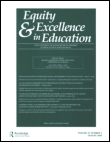
Equity & Excellence in Education
Cultivating a community dedicated to equity in education.Equity & Excellence in Education, published by Routledge Journals, Taylor & Francis Ltd, serves as a critical platform for scholarly discourse in the field of education, dedicated to promoting principles of equity and excellence in educational practices. With an impressive impact factor underlined by its Q1 status in the education category and a solid Scopus rank of #416 out of 1543, this journal appeals to a diverse audience of researchers, professionals, and students committed to addressing the multifaceted challenges of equity in education. Covering a span of research dating from 1963 to 2024, it welcomes original research, discussions, and practical insights that foster progress within educational systems. As an essential academic resource, it encourages its readers to engage with contemporary issues and innovations that support inclusive and equitable learning environments.
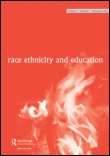
Race Ethnicity and Education
Shaping discourse on race and educational equity.Race Ethnicity and Education is a premier interdisciplinary journal published by Routledge Journals, Taylor & Francis Ltd, dedicated to exploring critical issues at the intersection of race, ethnicity, and educational practices. With an impressive impact factor and distinguished Scopus rankings placing it in the top quartile across categories such as Cultural Studies, Demography, and Education, this journal provides a rich platform for innovative research that addresses the complexities of educational equity and social justice. Since its inception in 1998, the journal has aimed to advance knowledge in these crucial areas, facilitating scholarly dialogue among researchers, educators, and policy makers. With a commitment to disseminating high-quality research, Race Ethnicity and Education plays an essential role in shaping the future of educational discourse, making it a must-read for anyone invested in the fields of education and social justice.
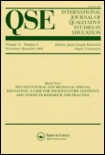
International Journal of Qualitative Studies in Education
Advancing Qualitative Research in Education.Welcome to the International Journal of Qualitative Studies in Education, a prestigious publication in the field of education, managed by Routledge Journals, Taylor & Francis Ltd. With a strong emphasis on qualitative methodologies, this journal serves as a critical platform for researchers, educators, and practitioners, providing insightful analyses and innovative approaches to educational inquiry since its inception in 1988. Recognized within the Q2 category in Education as of 2023, it holds an impressive Scopus rank of 570 out of 1543, reflecting its significant impact and relevance in social sciences and education research. Although it does not offer open access, the journal's rich content contributes to the advancement of qualitative research, encouraging discourse that shapes contemporary educational practices. With a commitment to rigorous scholarly standards, the International Journal of Qualitative Studies in Education aims to stimulate critical dialogue and foster community among researchers, professionals, and students seeking to deepen their understanding of qualitative research and its applications in the rapidly evolving educational landscape.
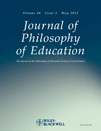
JOURNAL OF PHILOSOPHY OF EDUCATION
Fostering Interdisciplinary Dialogue in Education and Philosophy.JOURNAL OF PHILOSOPHY OF EDUCATION, published by Oxford University Press, serves as a premier platform for interdisciplinary research at the intersection of education, history, and philosophy. Established in 1967, this journal has consistently contributed to the academic discourse by publishing insightful articles that challenge conventional thinking and inspire innovative pedagogical practices. With a distinguished ranking in the top quartiles of History and Philosophy and a respectable Q3 position in Education, it occupies a significant niche in the scholarly community. The journal's high Scopus rankings signify its impact, being placed in the 94th percentile for History and the 86th percentile for Philosophy. It welcomes contributions that explore theoretical frameworks, historical contexts, and practical implications of philosophical inquiries into education. Although it does not currently offer Open Access options, the journal remains a vital resource for academics and practitioners seeking to deepen their understanding of educational philosophy. With contributions expected to continue until 2024, the JOURNAL OF PHILOSOPHY OF EDUCATION is poised to remain a crucial avenue for advancing educational thought and research.

STUDIES IN PHILOSOPHY AND EDUCATION
Transforming Educational Landscapes through Philosophical InquirySTUDIES IN PHILOSOPHY AND EDUCATION, a reputable journal published by Springer, is nestled in the dynamic intersection of philosophical inquiry and educational theory. With an ISSN of 0039-3746 and an E-ISSN of 1573-191X, this journal has been a significant platform for scholarly discourse since its inception in 1960. Located in the Netherlands, its impressive standing is reflected in its 2023 Scopus rankings, positioned in the Q1 category for Philosophy and Q2 in Education, alongside a commendable 90th percentile in the field of Arts and Humanities. Dedicated to fostering innovative thought and contributing to the evolving landscape of education and philosophy, the journal encourages submissions that explore diverse theoretical frameworks and practical applications. Although not an open-access publication, it remains an essential resource for academics, educators, and researchers aiming to deepen their understanding of the philosophical underpinnings of education. Engage with cutting-edge research and critical analyses that shape the future of educational practices and philosophical thought.